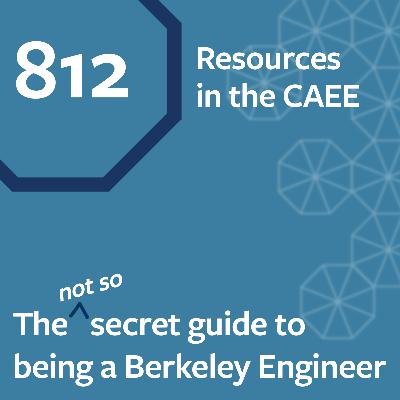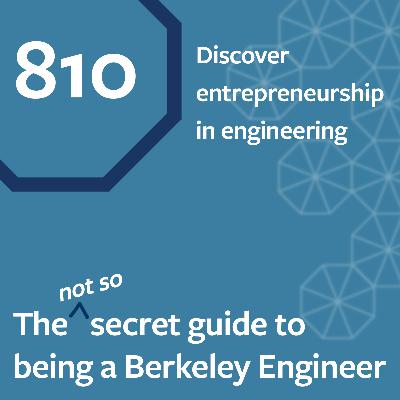Episode 303B: Transitioning to Berkeley Engineering: Transfer
Description
 </figure>
</figure>This week on the (Not So) Secret Guide to Being a Berkeley Engineer podcast we are splitting in two: first-year and transfer student experiences of transferring to UC Berkeley and becoming Berkeley Engineers. The second podcast is with two transfer students that just finished up their first year at UC Berkeley: Jonathan Kim, Electrical Engineering and Computer Sciences major, and Daisy O’Mahoney, Materials Science and Engineering major, share their experiences of transitioning from a California community college, finding study groups and tackling time management. If you have more questions for Jonathan and Daisy, send an email to ESS and we’ll pass it on.
Links & Resources suggested by Daisy and Jonathan:
- Listen to Tiffany Reardon’s Preparing for Berkeley Engineering podcast
- Check out test banks such as Tau Beta Pi’s
- Engineering specific tutoring: engineering.berkeley.edu/caee
- Watch webcast and legacy course content
- Make an appointment with your ESS adviser.
Episode transcript
LAURA VOGT: Hi my name is Laura Vogt and I’m the Communications and Events Manager for Engineering Student Services in the College of Engineering. Thank you for joining us this week for The (Not So) Secret Guide to Being a Berkeley Engineer. This week we are focusing on the first semester experience and breaking the podcast into two parts – freshmen and transfer. My guests today for this half of the podcast are transfer students that transferred to Cal last year, welcome Daisy and Jonathan
DAISY/JONATHAN: Hi, thanks for having us.
LV: Let’s start off with some introductions. Daisy can you tell us a little about yourself and what you’re studying?
DAISY: Yeah. So I transferred from Santa Barbara City College and I’m majoring in materials science and engineering and I’m very interested in magnetic electronic and optic materials and I’m hoping to go to grad school to study that.
LV: Excellent. Thank you so much for being here. And Jonathan your turn and tell us a little about yourself.
JONATHAN: Yes. So I transferred from Bakersfield College. My major here is EECS and I’ve yet to decide my core study but I want to go to cryptography in the end.
LV: Oh excellent. Thank you again both of you for being here. I really appreciate your time and I’m excited for you to share some of your experience and your expertise about coming to Cal with our new incoming students. So starting it off what do you remember about choosing that first semester schedule?
DAISY: I remember doing GBA and at the end of it it just gives you a list of classes that you should take. And I initially was like, all right that’s it, I’m just gonna sign up for those. But after talking to one of my friends, we realized that based on the certain prerequisites we had taken, it was having us sign up for classes that had prerequisites before taking those. And so, I had to go back in my group fix it. So my advice for that is just whatever it gives you just make sure it’s the right schedule for you specifically.
LV: Well that’s good to know. Okay, Jonathan what about you.
JONATHAN: When I first signed up for classes, I didn’t know what I was doing, I had to talk to a counselor. At least from my EECS perspective many of the lower division classes don’t carry over. So my first year I spent here was just finishing up my lower division and I’m just starting my upper divisions this coming fall. So, I will say that in community college if you can, try to find the community college that will transfer over the courses. If you can’t your first semester here will be taking lower division courses, essentially.
LV: And when you do that they usually give you an extra semester too, right? You’re not having to stay with the four semester rule. Do you have any tips for choosing the classes, like how did you choose a specific professor or the timing or anything along those lines?
JONATHAN: This is from my EECS perspective. I went ahead and chose a first one, which was the easy one and the second one was just a really hard one, which I paid for it. But I will say the first year will always be the hardest because you’re acclimating to the rhythm of Berkeley and Berkeley just expects more of you and expects you to perform at your best not just mediocre essentially.
LV: Daisy what about you.
DAISY: So for my major the classes are very set in stone where we have to take and all the classes are only offered once each year not once each semester. So there wasn’t that much choice in choosing for me but I know that I majored as you can choose and one way to decide if you want to sign up one teacher vs. another is the website Berkeley Time. You can go there and see the grade average for certain teachers, which can help you choose, if you have a choice in your classes.
LV: Well that’s good to know. What was registration day like for you? You’ve got all the transfer students are registering on the same day so that seemed to be a problem at all?
DAISY: I was so excited on registration day. The day I finally signed up for classes because I feel like I was still in disbelief that I was actually going to Berkeley and once I was signed up for classes it’s was like, alright, I’m actually, finally a Berkeley student. I just signed up for my classes at the time there wasn’t any like I didn’t have any problems.
LV: And once you register how did you monitor your schedule through the summer? Were you’re having to worry about changing classes or if you were on a waitlist or anything along those lines?
DAISY: I was on the waitlist for one of my labs and so I would just periodically check to see if I moved up and luckily I got off the waitlist by the time classes started.
LV: Did you get any notification or it was just because you kept going in and checking?
DAISY: Well I saw when I signed up for the class that it put me on the waitlist and so I was personally like stressed out like oh I hope we get in this class. So I just kept checking until I was off the waitlist.
LV: We actually have a podcast that Tiffany Reardon did earlier this summer that talked about classes that you can take for free online. Oh the Khan Academy I think one of them was, that give you some programming background if you need to. And she also suggested looking at tests you can go through and find test banks for different courses and give yourself an idea of what’s coming up.
DAISY: I really recommend utilizing test space here. Tau Beta Pi has test archives for most classes and is specifically engineering, I think, and that’s super helpful to see what the class is going to expect of you.
LV: Well, it’s nice so you can prepare for that but not just prepare for testing but prepare so you know what you’re getting into.
DAISY: Yes, it has syllabuses too. So you can read the syllabus for your class beforehand too. LV: We talked a little bit about that transition between community college and Berkeley. What did you find to be the hardest part of that transition?
JONATHAN: For me, I had the lone wolf mentality. Where I studied alone, succeeded alone, fell alone. Coming here I realized you can’t succeed at Berkeley by yourself. You need people to help you. You will have rough days and you need people to talk to you backup and vice versa. For me, my study habits had to change a lot. Where I started the day before the exam at my college and I’d get an A, here I tried that once, it came with very disastrous midterm. You just got to gradually learn here, because here, they test you on knowledge not just on the material learned. They want to know if you could apply what you learned.
LV: OK, Daisy?
DAISY: The amount of time that you have to put into classes is very different. And just like what classes expect of you. At my community college I was always able to get my homework done way ahead of time and I’ve plenty of time to study the material outside of the homework and then here, the homework takes up so much time that I don’t have the time to study in the same way that I did before. Navigating that was difficult. And then also, the exams are very different because I’m used to having time to read over the questions and really think about it before I answer and then hear a lot of times it’s a 50 minute exam, cram as many questions in there as possible, so you just go as fast as you can and just answer as much as you can. And so that was also very different to adjust to that.
LV: That leads me to my next question. How did you manage your time? What did you have to change for your time management tools?
DAISY: Well I ended up like overworking myself and just not taking any time off because I’m used to being able to get everything done and be super confident for an exam before I take it. And here I just can’t ever get to that level of

























